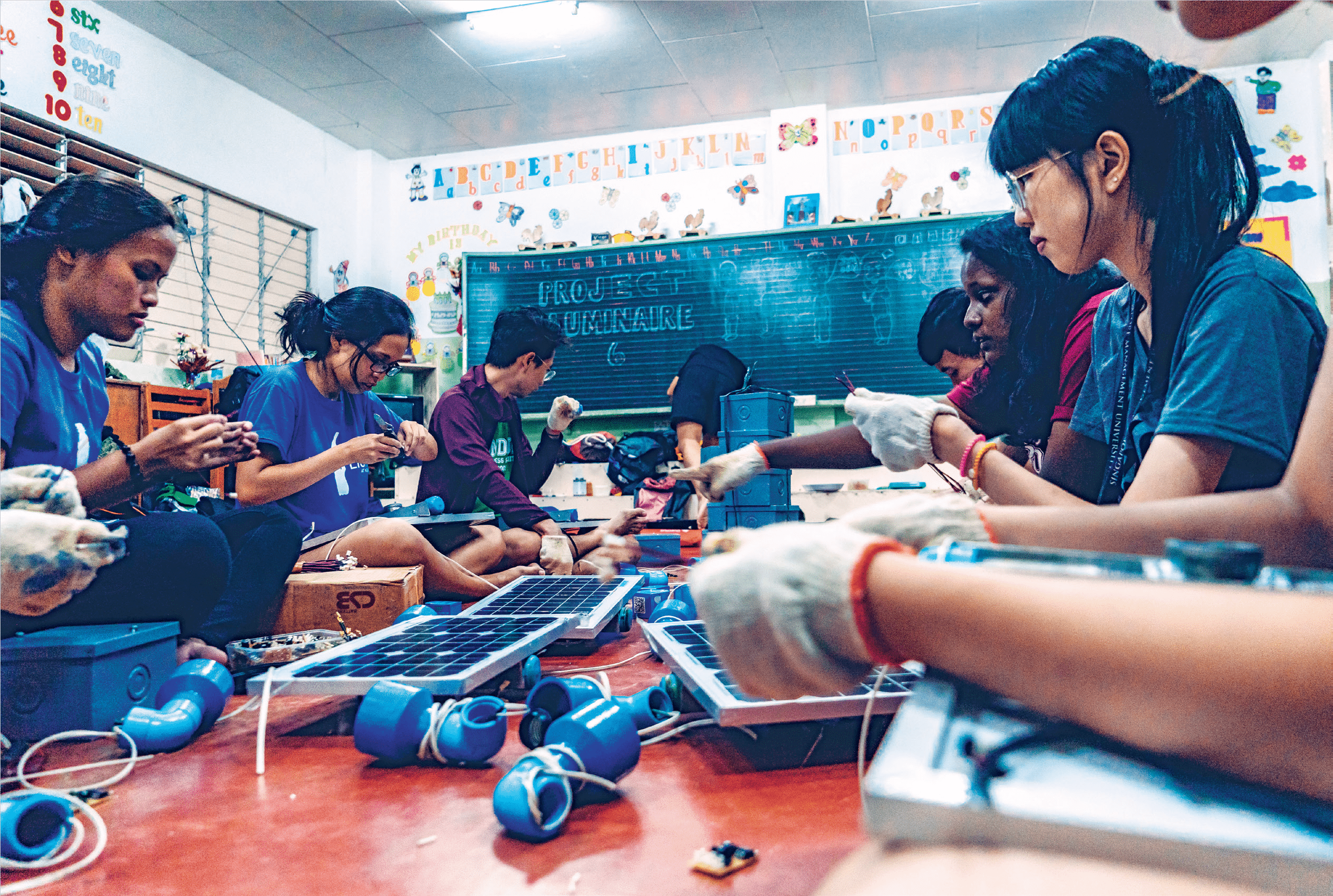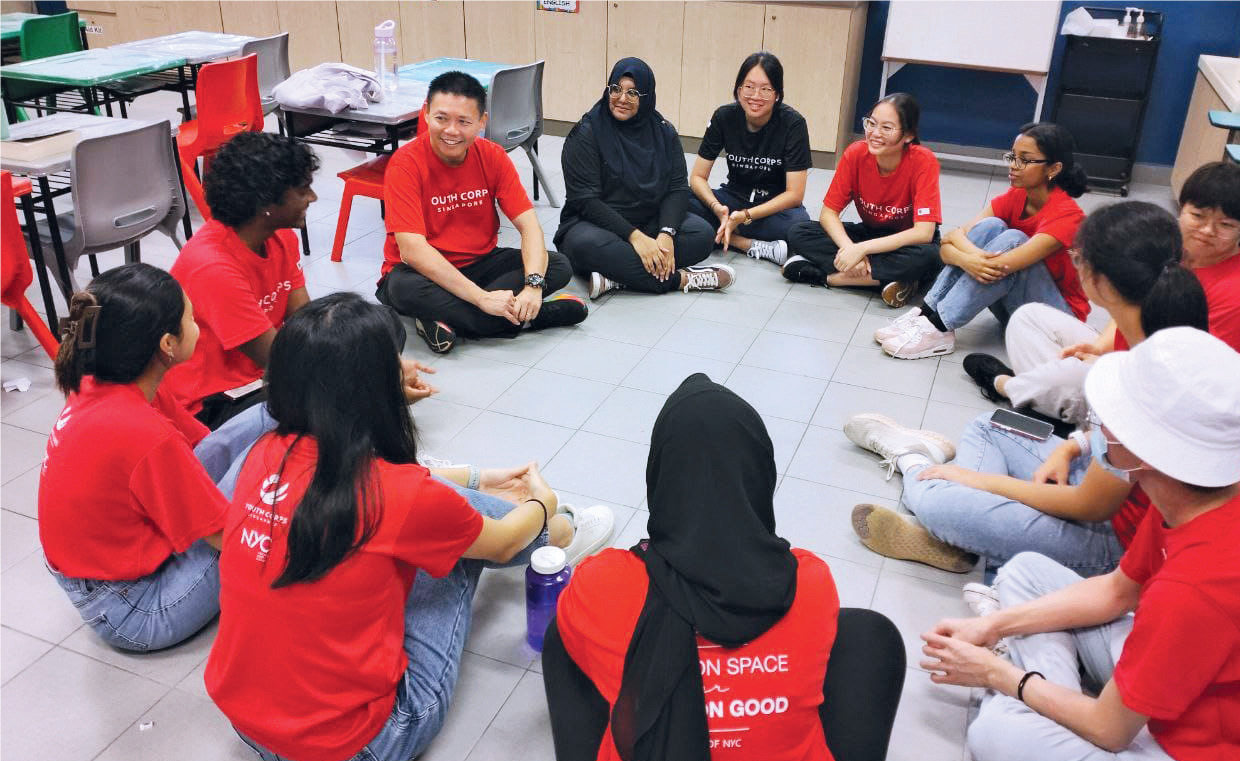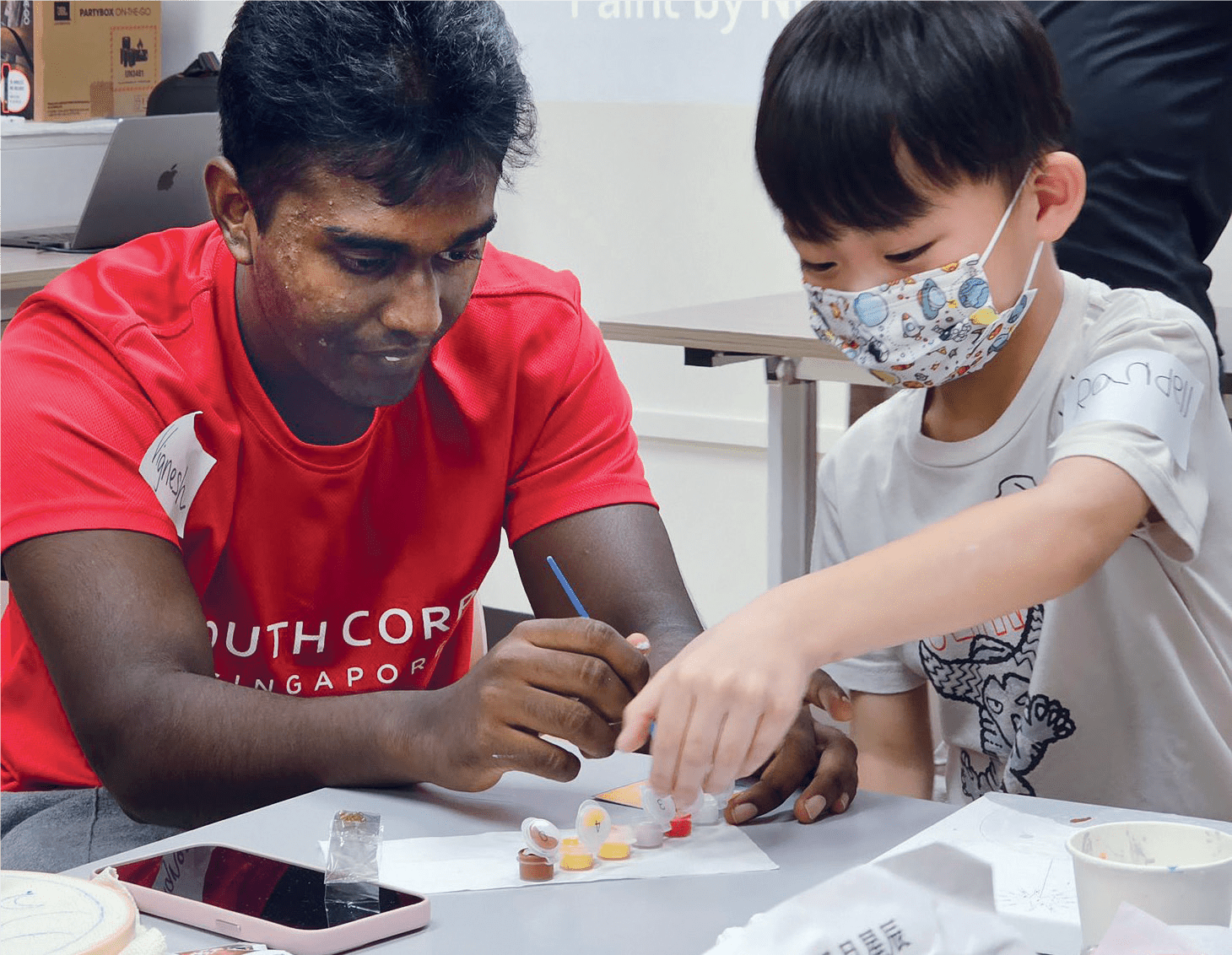Stories > In The Driving Seat
In The Driving Seat
Youths around the world are emerging as changemakers as they strive to make a positive impact on communities through grassroots initiatives and technology.
BY RAHIMAH RASHITH

Students from Singapore Management University collaborated with the Philippines-based non-profit Liter of Light to provide affordable and sustainable solar-powered lights to rural areas.
very weekend, tertiary student Mahshuk Begam Binte Shaik Mujibur Rahman dedicates her time to teaching maths at Kids Count @ Bedok, a programme in Singapore that aims to bridge the gap in numeracy skills among children from low-income families.
The programme is one of several youth-led initiatives run by Youth Corps Singapore (YCS), the volunteering arm of the National Youth Council (NYC).
In 2022, nearly 6,000 young Singaporeans volunteered their time to local and overseas community service in YCS programmes. Their cumulative efforts spanned over 50,000 service hours, a 20 per cent jump from pre-pandemic times.
An uptick has been noticed worldwide of the increasingly important role that youth populations — there are 1.8 billion people aged 10 to 24 years old — play in shaping development, both globally and locally.
“My mission is to navigate the
volunteerism space together to foster
trust, and use technology to enable
individuals to support each other.”
Willoughby Niki Lee Yan Xing, SIF DigiLABS Programme volunteer
COMMUNITY-DRIVEN CHANGE
According to a joint report by the
International Association for Volunteer
Effort and International Forum for
Volunteering in Development, youths
pursue a wide range of issues from social to environmental causes, and
leverage technology to contribute to
meaningful causes.
NYC attributes the growth in its youth volunteerism programmes to the availability of shorter and community-centred volunteering options. Apart from NYC’s volunteering arm YCS, young people are also volunteering through institutes of higher learning, as well as organisations such as the Singapore International Foundation (SIF).
The desire to give back to the community is what compelled 13-year old Indonesian Ammara to start an eco enterprise. Growing up in Baturaden, Central Java, she witnessed the plight of farmers whose meagre income was not growing and was increasingly dictated by external factors such as changing weather patterns.

Ong Kah Kuang (in red, facing front), executive director, Youth Corps Singapore, talks to youth volunteer Mahshuk Begam Binte Shaik Mujibur Rahman (on his left) and other youth volunteers.
Along with four friends, she launched Batuva, which means happy farmer in Bahasa. After discussions with local farmers, Ammara and her friends realised that most farmers sold their products in loose plastic bags.
The enthusiastic youths discussed sustainable farming practices, packaging and the role of marketing. Teaming up with nine farmers in 2020, the team has been able to develop seven original products ranging from ginger powder to honey, packaged for a wider audience that appreciates sustainably sourced products. These are marketed via social media platforms.
“To make a big change, we should first look for challenges around us,” she says. “This will help us to be more empathetic while collectively addressing these challenges.”
In the western Indian city of Nagpur, 19-year-old Wasudev Mishra started social enterprise Silaigram, which empowers women in surrounding rural areas through employment as seamstresses. The firm uses discarded materials from textile factories and decor houses to upcycle fabrics that would have otherwise ended up as waste in landfills or oceans.
Business mechanics aside, Mishra, like his Indonesian peer Ammara, emphasises that the starting point for every societal challenge that largely affects the underprivileged populace anywhere is empathy. “We started by talking to some of the women in rural areas as to the problems they face, and we decided to empower them through their own stitching skills,” he shares.

Singaporean youth volunteer Vignesh Narayanan (in red) volunteers locally as well as overseas in countries such as Vietnam through Youth Corps Singapore’s Beyond Singapore Cluster programme, which encourages young Singaporeans to join community development initiatives in foreign countries.
CROSS-BORDER VOLUNTEERISM
Another growing trend is that of
Singaporean youths venturing overseas
to help communities and build new
pathways to collective development.
YCS also runs Beyond Singapore Cluster
(BSC), a programme that creates
opportunities for Singapore youths to learn, engage in and contribute to social
causes beyond Singapore.
For 18-year-old BSC volunteer Vignesh Narayanan, serving the cluster has been deeply fulfilling. The full-time National Serviceman section commander seeks out underserved communities in Asean through the BSC programme, whose initiatives include promoting awareness of the UN’s Sustainable Development Goals, reaching out to transnational families, and conducting vital digital literacy workshops for women in Vietnam.
Youth volunteers like Vignesh see serving the community as a chance to empower the underprivileged, foster compassion, grow personally, and enhance intercultural understanding. According to him, while top-down government programmes are vital, they find their true strength when backed by bottom-up volunteer efforts. “Frontline volunteers understand community needs, become role models, and bridge societal gaps,” he notes.
“As one of the world’s most
connected countries, it is important
that Singaporean youths appreciate
the diverse cultures and issues
faced by our global partners.”
Ong Kah Kuang, executive director, Youth Corps Singapore
Ong Kah Kuang, the executive director of YCS, emphasises the importance of overseas volunteering programmes. “As one of the world’s most connected countries, it is important that Singaporean youths appreciate the diverse cultures and issues faced by our global partners,” he says. “International volunteering, through the Youth Expedition Programme, is one such opportunity that broadens the horizons of our youths, allowing them to become culturally aware and resilient Asia-ready youths, capable of making a difference both at home and overseas.”
In Singapore, institutes of higher learning are also helping to bolster overseas community initiatives. For instance, students at Singapore Management University (SMU) engage in community service through local and overseas programmes. As a graduation requirement at the university, all undergraduates must complete a minimum of 80 hours of local or overseas community service.
In one such project, SMU students’ driven initiative, Project Luminaire, collaborated with non-profit Liter of Light to provide affordable, sustainable solar-powered lights, which are made using locally-sourced materials, to Sitio Alao town in the Zambales province of the Philippines. The project has benefitted 1,005 individuals as of mid-2023.

Malaysian changemaker Zaim Mohzani, an SIF Asean Fellow, volunteer and co-founder of non-profit Nation Building School, helps people from disadvantaged backgrounds upskill and find employment.
SKILLS-BASED DEVELOPMENT
Youths are also increasingly engaged
in advocating for education and skill
development, engaging in activities such
as mentoring, tutoring and providing
vocational training. Zaim Mohzani, an
SIF Asean Fellow and volunteer, and co-founder of Nation Building School,
a Malaysian NGO, focuses on
offering opportunities for
upskilling and employment,
particularly for those from
underprivileged backgrounds.
Zaim’s organisation champions free capacity-building workshops and mentorship programmes, and has impacted over 10,000 individuals in the past eight years. Recognising the recurring issues of unemployment and underemployment among young people, he aims to address these issues often overlooked by policymakers and society.
Reflecting on a past encounter with a young individual facing challenges, he shares, “He had aspirations but felt that nobody actually believed in him. And I had a chance to mentor and guide him for six months.
“And looking at him today, he is a fast-rising executive at one of the biggest banks in Asia. My main mission is to help such individuals realise their potential and to cross whatever barriers they have.”
Technology consultant for global firms, Willoughby Niki Lee Yan Xing, mentors students across the world to use digital skills for the greater good. As a lead volunteer trainer at the SIF DigiLABS Programme, the 26-year-old Lee and his team of 30 volunteers have conceptualised IT and future skills programmes in cybersecurity and artificial intelligence (AI) for students across Asia, to help them address social issues such as disability and digital literacy in their countries, as well as seek employment.
One of Lee’s projects in particular, Way Back Home, won a global award (Intel AI Global Impact Festival 2023) for using generative AI to help seniors with dementia navigate their communities more effectively. The project, which is still in its prototype stage, uses mobile kiosks where seniors can go to for wayfinding, should they be lost.
For him, volunteering is more than just utilising digital literacy. The National University of Singapore graduate believes that fostering cross-cultural interactions and partnerships through digital workshops can ultimately create a stronger, more inclusive world.
“I have always believed in bringing people together, whether in times of celebration or during challenges,” he says. “My mission is to navigate this space together to foster trust, and use technology to enable individuals to support each other.”
THE VIGOUR IN VOLUNTEERISM
A conference in Kuala Lumpur provides a platform for discussing positive community impact.
The chairperson of the International Forum for Volunteering in Development (Forum), Heather Shapter, observes that there has been a global shift in volunteerism with more youth involvement. “It is all about young people, as in how do we even further empower young people to be the next generation of changemakers on the planet,” she commented during a media interview at the International Volunteer Cooperation Organisations conference.
The annual conference is organised in different parts of the world by the Ireland-based Forum, a global network of volunteer-involving organisations committed to international volunteering for development. This year, the event was held in Kuala Lumpur, Malaysia and brought together 170 global leaders, policymakers and volunteers to explore the role of youth volunteers in shaping the future of international volunteering.
The event serves as a platform to address the challenges and opportunities in the field of volunteering for development, both longstanding and newly emerging.
